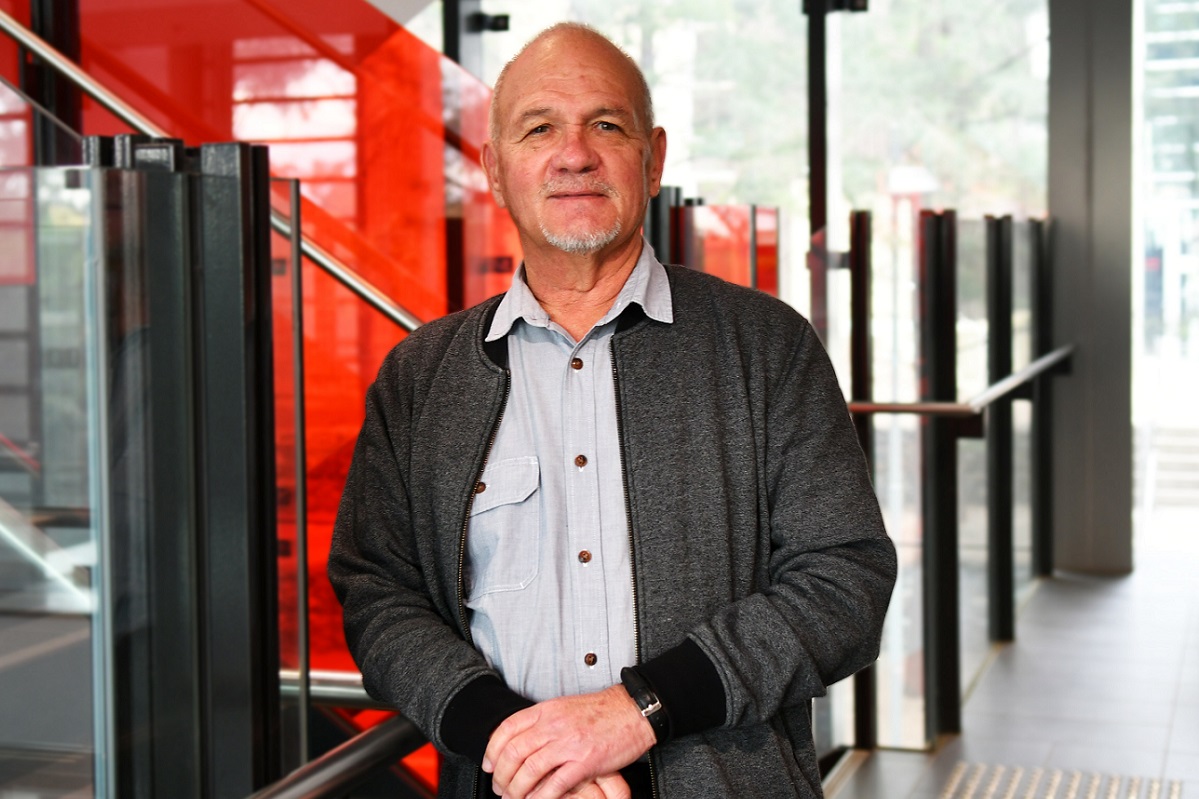
Darryl Cameron sees life-long learning and community contributions as integral to the part he plays in helping close the gap on Aboriginal and Torres Strait Islander disadvantage. Of Ngarrindjeri descent, the Murray Bridge local this year starts his PhD (on palliative care in rural and remote areas), alongside his lecturing role with Flinders Rural Health SA.
What does your work involve at Flinders University?
Currently I am an Aboriginal lecturer (level B), within the Aboriginal and Torres Strait Islander, Rural Health SA, College of Medicine and Public Health.
My main role is to teach cultural awareness and safety to the Parallel Rural Community Curriculum (PRCC) to the MD-111 students. I also promote Flinders University by engaging with schools that have Aboriginal and Torres Strait Islander students who could be interested in studying at a higher level and in particular, medicine and other allied health disciplines.
My role covers a wide area and expertise as I do sit on quite a number of varied committees and I am a Board member of the local Moorundi Aboriginal Community Controlled Health Services, based in Murray Bridge.
I have a Masters’ Degree in Public Health and this year have been accepted to study a PhD part-time at Flinders University, as I have an interest in palliative care in rural and remote areas.
What inspired you to follow this career path?
I have always been inspired to improve the lifestyle of Aboriginal and Torres Strait Islander people.
I completed certificates III and IV in Aboriginal Primary Health Care and my interest grew to study in other health disciplines. I delivered health programs within the Aboriginal communities of SA, Queensland and the NT.
I have been involved in Aboriginal health for a good part of 30 years. I want to see an improvement in health outcomes and to work towards closing the gap and life expectancy of Aboriginal and Torres Strait Islander people to that of non-Aboriginal Australians.
What is a key priority for you?
I have a broad interest in palliative care and the welfare of Aboriginal and Torres Strait Islander people who suffer from debilitating cancers. Often the survival rate is low due to late prognosis. The rural and remote people are disadvantaged due to their location and lack of health services. I particularly loved working in the cardiothoracic ward of the Flinders Medical Centre.
While ‘closing the gap’ is a great initiative, of the seven indicators that the government measures to improve health outcomes, only two have been met. There needs to be a greater emphasis placed on chronic conditions within Aboriginal and Torres Strait Islander communities, and only then will there be accessible and equitable health outcomes.
What has been a highlight of your work, or proudest moment?
I think that the proudest moment and highlight from my overall working career has been my ability to study and become a better person in improving my own education and that of others.
Completing and graduating from my Masters’ Degree in Public Health (MPH) (Deakin University) was by far the greatest of achievements and a thrill to attend that graduation as a postgraduate at a higher level.
Can you share a challenge and how you overcame it?
Often as an Aboriginal person we are challenged by our peers by our very existence. I was once told that we should “build a bridge and go over it”. This was in reference to the close the gap initiatives introduced by the Federal Government of 2007. I had been given a quote by an Elder who said “being disadvantaged is just another product of domination” and the only way that I could move forward was to ignore the ignorance of some and work towards meeting the targets of some of the closing the gap initiatives set down at the time. There have been gradual improvements, however there is still a long way to go and the goal posts continue to change to try and meet these targets established to improve the life expectancy of Aboriginal and Torres Strait Islander people.
How do you like to relax outside of work?
Football and gardening and my family are my life. I have two grandsons that keep me young and active. I am a life member of the Imperial Football club in Murray Bridge, and follow that club religiously.
I just completed 41 seasons as a goal umpire at all levels, and I can honestly say that I enjoyed every one of those seasons. Local football, my family and my community is my life.
What does a normal day look like for you?
Busy! I maintain (at times) a healthy lifestyle and while I too have several chronic comorbidities I am compliant and remain active.
I remain committed to improving Aboriginal and Torres Strait Islander health outcomes, and I have been a past Aboriginal Health Worker, Manager of the Aboriginal Primary Health Care Unit, Aboriginal educator at the Aboriginal Health Council of SA, and team leader of the Aboriginal team based in the Flinders Medical Centre, nursing.
I am about to embark on another learning journey in my PhD, which I hope to start within coming weeks.
While I have the capabilities and the strength to carry on, there is ‘no normal everyday’ and I will continue to fight for our survival, and the rights as a people, to enjoy the same privileges we all should have.

